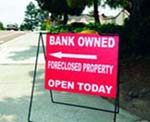
When it comes for foreclosures and shorts sales it truly is "Buyer Beware"
Best Home Values
There’s no question that prices on foreclosures sound attractive. Often, however, buyers who believe they’ve gotten a bargain find themselves faced with expensive and unanticipated repair costs caused by neglect, at times, outright vandalism.
Plus, the process of making offers and obtaining financing for foreclosures can be complex and time consuming, experts say, while less favorable mortgage interest rates may more than offset a lower sales price.
There are many reasons to buy a new home versus a foreclosure, say experts. Most importantly, new homes are protected by warranties, meaning there’ll be no unpleasant—and expensive —surprises.
By law, conventional sales on new or resale homes require full disclosure of any problems—and the seller can be held liable if a problem arises as a result of an issue that wasn’t disclosed prior to closing.
With foreclosures, however, it’s always a “buyer beware” situation. When you buy a foreclosed home, you have no recourse against the seller if there are construction defects, environmental hazards or problems of any kind.
Kathleen Gallagher McIver, chairman of the Orlando Regional Realtor Association and a broker with ReMax Town and Country Realty, notes that during the first several months of 2010, about three-quarters of home sales in Metro Orlando involved distressed properties.
“I tell my clients to be careful,” McIver says. “Because there are no disclosure requirements, a foreclosure might become a money pit.”
McIver adds that many real estate professionals would prefer to sell new homes or resale homes that have not been seized by lenders. However, she says, many buyers are still drawn
to what appear to be bargain prices.
But are foreclosures really bargains? Not necessarily, say the experts.
“Current market conditions mean you might find a low price, but it comes with a risk,” says Steve O’Dowd, president of the Home Builders Association of Metro Orlando and owner of O’Dowd Construction. “Unfortunately, in many cases that risk is realized after the purchase.”
In addition to aesthetic problems, which are easy to see, complications may come in the form of structural defects, outdated components, inefficient energy usage and failing mechanical systems.
And with a foreclosure or a short sale, the buyer is responsible for repairs.
The fact is, many owners stop caring for their homes when they realize that foreclosure is imminent. Others go so far as to damage their homes before vacating.
“I looked at a lot of foreclosures,” says Nicole, a 27-year-old first-time buyer who asked that her last name not be used. “The condition on most of them was just horrible. Cabinets were stripped off the walls. Fixtures were gone. Once you factored in the cost of repairs, it just wasn’t worth it.”
In addition to the investment required to make a neglected home habitable, the price of a foreclosure can be pushed up by multiple offers.
Increasingly, buying and selling foreclosures is becoming the province of professional investors, not people who actually intend to occupy the homes. That means the price at which a property sells is often significantly higher than price at which it was offered.
And banks will insist that repairs be made as a condition of obtaining a mortgage loan. If these costs are included in the loan amount, you could find yourself paying as much for a damaged home as you would have paid for a comparable new home in pristine condition.
Short sales are different from foreclosures, but they have their own set of challenges.
A short sale occurs when a homeowner who wants to avoid bankruptcy or foreclosure gains lender approval to sell his or her home for less than they owe.
In such cases, the lender calls the shots. Even if the owner accepts your offer, obtaining lender approval is a time-consuming process that can take several months. So short sales require time, patience and may result in disappointment since lenders frequently reject offers that are below market value.
“Every bank has a different set of rules,” says McIver. “We’ve dealt with short sales where we’ve gone through four or five contracts before an offer is accepted.”
Still, new-home builders have responded to the competitive challenge that foreclosures and short sales represent.
Many offer incentives such as below-market financing or help with closing costs, which can save thousands of dollars and make it easier to qualify.
Plus, in addition to warranties, new homes are equipped with the latest leading-edge technology in terms of energy efficiency and eco-friendliness. And, because you’re purchasing directly from the builder, closings can take place quickly.
Of course, the ultimate benefit of buying new is having the opportunity to make the home truly yours. In many cases you’ll be able to customize your home, selecting items such as cabinetry, countertops, and flooring.
Rather than settling for someone else’s choices, you have the advantage of living in a home and a neighborhood that truly reflects your taste, lifestyle and personality.
“The purchase of a foreclosure or short-sale home is like eating a meal in a restaurant that doesn’t receive Health Department inspections and uses food that isn’t USDA or FDA approved,” says O’Dowd. “You might enjoy the fact that you paid below-market for the meal, but find yourself terribly ill later.”
If you’re a risk-taker or an investor, a foreclosure or even a short sale could be right for you. But for most people, adds O’Dowd, the purchase of a new home offers “peace of mind.”
“Risk is minimized because you know that the builder stands behind the product, as do the subcontractors and suppliers that were involved in its construction.”
